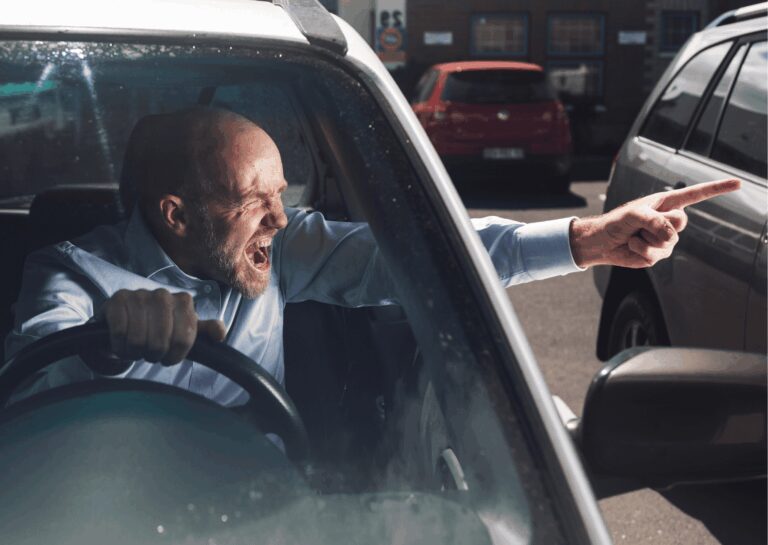Based in Northern Colorado, we’ve worked with drivers across the state, from Denver’s rush-hour crawls to mountain passes crowded with visitors. We’ve seen tempers flare over a simple lane change or brake check, turning everyday drives into dangerous encounters.
Road rage isn’t just about angry shouts or honking horns; it can escalate into collisions, assaults, and lasting legal consequences. With tourism booming and commute times rising, understanding how Colorado handles aggressive driving is more important than ever.
In this guide, we’ll walk you through what road rage means in our state, how it differs from aggressive driving, the penalties you could face, and strategies rooted in defensive driving that can keep you and everyone around you safe on the road.
Quick Answer: What Colorado Drivers Should Know About Road Rage?
Road rage occurs when everyday driving frustrations intensify into intentional, hostile acts. In Colorado, there’s no specific “road rage” offense; instead, you might be charged under statutes like reckless driving or careless driving (both carrying penalties such as fines, license points, and possible jail time) or even assault if violence occurs. Penalties vary by behavior and severity.
What Is Road Rage?
We define road rage as the escalation of everyday driving frustrations into angry or violent behavior directed at another road user. Unlike routine impatience, road rage involves the intent to intimidate, retaliate, or cause harm.
Common triggers:
- Traffic congestion and stop-and-go delays
- Perceived slights (being cut off or brake-checked)
- High speeds and a racing mindset
- Distractions (phone calls, navigation alerts)
Typical behaviors:
- Horn-blaring or flashing headlights at another driver
- Tailgating or intentionally cutting off vehicles
- Verbal insults, obscene gestures
- Exiting your vehicle to confront or threaten
You might spot a driver weaving aggressively through lanes or slamming brakes intentionally; these actions signal frustration tipping into dangerous aggression. It only takes a moment for a heated exchange to turn deadly. Always prioritize safety over pride, steering clear of escalating any conflict. If you find your heart racing, pull off the road or dial back your speed, don’t let anger drive your actions.
Aggressive Driving vs. Road Rage
Aggressive Driving
- Unsafe behaviors without intent to confront
- Examples: speeding, unsafe lane changes, running red lights, rolling stops
Road Rage
- Intentional hostile or violent acts
- Examples: tailgating with intent, chasing another vehicle, verbal or physical assault
- Treated as criminal behavior (reckless/careless driving, assault charges)
While aggressive driving can earn you tickets and points, road rage crosses the line into possible jail time and misdemeanors. Knowing your potential charges can shape your defense. Don’t confuse unsafe habits with deliberate aggression.
Potential Consequences of Road Rage Incidents
When frustrations boil over on Colorado roads, the fallout can extend far beyond a bruised ego. Here’s what you and others face when road rage spins out of control:
- Safety risks
- Collisions, rollovers, multi-vehicle pileups
- Serious injuries or fatalities for you, your passengers, and other road users
- Legal ramifications
- Arrest and criminal charges
- Depending on the charge, a criminal record could affect future opportunities, including employment or housing.
- Financial burdens
- Court fines ranging from hundreds to thousands of dollars
- Increased insurance premiums, sometimes double your current rate
- You could also face civil lawsuits if another driver pursues damages or medical costs after a road rage incident.
- Emotional and psychological impact
- Post-traumatic stress for victims involved in a violent confrontation
- Anxiety or guilt for the aggressor, straining family relationships
- Long-term consequences
- License suspension or revocation
- Courts may require additional education, such as defensive-driving courses, depending on the case.
Road rage can leave you literally paying the price in health, freedom, and finances, so steering clear of risky behavior is always the smarter move.
Is Road Rage a Crime in Colorado?
You won’t find “road rage” spelled out in Colorado’s statutes, but aggressive acts behind the wheel are prosecuted under several criminal and traffic laws:
- Reckless Driving (C.R.S. 42-4-1401)
- Class 2 misdemeanor
- Up to six months in jail, $50–$1,000 fine, eight DMV points
- Careless Driving (C.R.S. 42-4-1402)
- Class 2 petty offense (unless injury/death occurs, then Class 1 misdemeanor)
- Fine up to $300, four DMV points (misdemeanor: higher fines, jail possible)
- Assault, Menacing, Harassment
- If you exit your vehicle and threaten or harm someone, you can be charged under these criminal statutes
- Vehicular Assault/Homicide
- Elevated to felony charges when your actions cause serious injury or death
Law enforcement decides charges based on intent, severity, and evidence (video footage, witness statements). In practice, a single aggressive maneuver can trigger multiple counts, so what feels like “letting off steam” can quickly become a criminal case.
Final Thoughts on The Essential Road Rage Guide for Colorado Drivers
Road rage isn’t a harmless outburst; it’s a legal minefield with real risks to your freedom, finances, and safety. We encourage you to commit to calm driving: consider a defensive-driving class or an online driver education course for added flexibility and practice. Review Colorado’s traffic laws, and share these tips with fellow motorists. Keep your cool, and let common sense steer the way.
